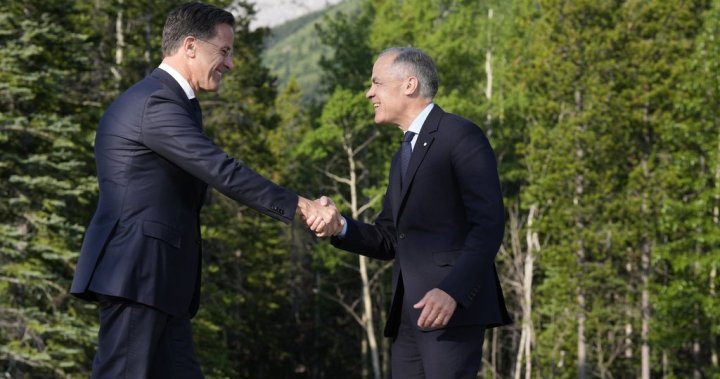Prime Minister Mark Carney is heading to Europe on Sunday for a series of summits where he plans to make significant pledges concerning Canada’s security and defense.
Joining Carney will be Foreign Affairs Minister Anita Anand, Defence Minister David McGuinty, and Defence Procurement Secretary Stephen Fuhr at the EU and NATO summits, with military procurement and supply chain diversification high on the agenda.
These international meetings occur as Canada aims to lessen its dependence on U.S. defense procurement due to ongoing tensions over tariffs and former President Donald Trump’s comments suggesting Canada should become a state of the U.S.
Carney will kick off his visit in Brussels, Belgium, beginning with a stop at the Antwerp Schoonselhof Military Cemetery, which is the resting place of 348 Canadian soldiers.
He is also scheduled to meet with Belgian Prime Minister Bart De Wever, European Council President António Costa, and European Commission President Ursula von der Leyen.
During the EU-Canada summit, Anand and McGuinty are set to sign a landmark security and defense agreement with the EU, which a European official described as one of the most ambitious accords Europe has ever made with a non-EU nation.
This agreement will facilitate Canada’s involvement in the ReArm Europe initiative, granting access to a 150 billion euro defense procurement loan program, titled Security Action for Europe.
An EU representative briefing the media mentioned that once the procurement agreement is finalized, Canada must negotiate a bilateral deal with the European Commission to explore procurement options with member states.
A Canadian official updated the media about the summit on Saturday, stating that the initial agreement would permit Canada’s involvement in certain joint procurement projects, while a subsequent agreement would be required to allow Canadian companies to participate in bidding.

At the EU-Canada summit, leaders will likely release a joint statement emphasizing their commitment to maintaining pressure on Russia, potentially through additional sanctions, and calling for a permanent and immediate ceasefire in Gaza.
Following Brussels, Carney will head to The Hague for the NATO leaders’ summit on Tuesday and Wednesday.

Get daily National news
Receive the top news, political stories, economic updates, and current affairs delivered to your inbox daily.
In The Hague, Carney will have discussions with the King of the Netherlands and Nordic leaders regarding Arctic and transatlantic security.
During the NATO summit, Carney will engage in bilateral meetings with other leaders. The summit program will feature a social dinner hosted by the Dutch king and queen, followed by a two-and-a-half hour session of the North Atlantic Council.
NATO allies are expected to discuss a proposal to increase the defense spending target for member countries to five percent of their national GDP. According to NATO statistics, no member has reached this target in 2024.
A Canadian government official provided background information to reporters, indicating that discussions regarding the spending target and its timeline are ongoing, with some allies advocating for a seven-year timeline and others seeing a decade as more suitable.
Canada has not met the five percent defense spending threshold since the 1950s, and has not achieved the two percent mark since the late 1980s.
Three Iranian nuclear sites have been highlighted, emphasizing their role in the ongoing Israel-Iran tension.
NATO reports that, according to its calculations, Canada allocated $41 billion for defense in 2024, which accounts for 1.37% of its GDP. This is a significant increase from 2014, when Canada spent $20.1 billion, or 1.01% of its GDP, following the establishment of the two percent target.
Back in 2014, just three NATO countries—the U.S., the U.K., and Greece—met the two percent target. By 2025, all nations are anticipated to comply.
Any new spending guidelines must receive approval from all 32 NATO member nations.
Kerry Buck, a former Canadian ambassador to NATO, informed The Canadian Press that the compact agenda aims to “prevent public disputes among allies,” referring to Trump as an “uncertainty engine.”
“The landscape of national security has shifted dramatically,” Buck shared, noting that allies neighboring Russia are facing the greatest risks. “There’s a significant chance that the U.S. could undermine NATO when all allies are becoming increasingly vulnerable.”
Trump has implied that the U.S. may withdraw its mutual defense obligations to NATO if member nations do not increase their defense budgets.
“Any actions we take to navigate this NATO summit without notable public rifts between the U.S. and its allies, while addressing the longstanding U.S. request for a fairer distribution of defense spending, will be beneficial for Canada as NATO is crucial for our interests,” Buck noted.
Carney has already visited Europe twice this year—once for meetings in London and Paris, and another to attend Pope Leo XIV’s inaugural mass in Rome.
© 2025 The Canadian Press





